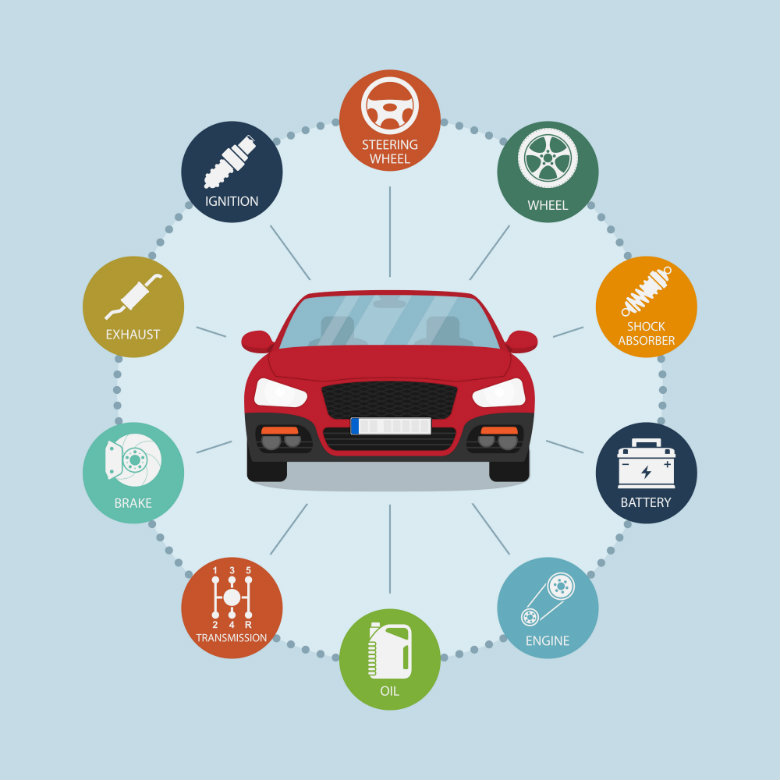6 Car Maintenance Strategies to Reduce Accidents
You can employ good car maintenance to prevent accidents. We have listed six useful hints for maintaining a car below.
1. Clean Your Headlights
Many vehicle owners assume their vehicle’s headlights are in good working order as long as they turn on when you’re using them, but practical maintenance can improve the performance of your headlights. You may want to clean your headlights if you’ve never done so before.
Start by examining the plastic covering on your headlights. Is the plastic clear, or is it dingy or yellowing? Many car manufacturers apply protective films to the outside of the lenses that protect your headlights. UV rays can damage this film, resulting in a yellow or foggy appearance on the lenses. This cloudy appearance can impair your visibility when you are driving at night.
What can you do if your headlights’ plastic coverings are no longer clear? To clean your headlights, you can use a headlight restoration kit that may include sanding and waxing the coverings. Follow the instructions carefully to ensure you are cleaning your vehicle’s headlights properly.
If there isn’t a major improvement after you’ve finished cleaning your headlights, you may want to use another kit or purchase replacement headlights.
2. Check Your Tires Regularly
The safety of your tires is essential, especially in hazardous weather situations. Roads can become slick due to rain, snow, and ice, but having good tires can help you avoid collisions. As a result, you should periodically examine your tires to make sure they’re in top shape.
Check your tires for sidewall cracks, uneven wear, or other issues that might necessitate rotating, replacing, or aligning them. You might need to get new tires if the tread on your tires is noticeably worn or uneven.
Additionally, you might want to regularly check your tire pressure, especially during colder months when tires are more likely to lose air. A tire with the correct air pressure will not only keep you and your loved ones safe, but you might get better gas mileage as a result. Make sure your tires are filled as recommended by the manufacturer to avoid accidents.
3. Ensure Your Brakes Are Safe
Your brakes, like your tires, are essential to the security of your car. In wet weather, such as rain, snow, or ice, both components are very important. Additionally, having worn brake pads might harm your rotors and necessitate expensive repairs. In addition to worn brake pads, various problems including fluid leaks and other problems can make the brakes fail and result in a serious accident.
Check your brakes frequently to prevent car accidents, especially if you don’t drive your car every day. Long periods of idle time can lead to rust accumulation and lessen the effectiveness of your brakes. Have your brakes checked by a professional who can search for worn components if you don’t feel confident performing routine maintenance on your own.
If you don’t feel confident performing routine brake maintenance on your own, have a professional inspect your brakes so they can check for worn brake pads and repair broken rotors.
4. Inspect Your Wiper Blades
Visibility is essential for driving safely. Over time, natural wear and tear to wiper blades will become one of the most common car issues. Inspect your wiper blades regularly for tears, cracks, stiffness or other signs of wear. If you notice any of these, you may want to replace them to enhance your vehicle’s visibility.
It’s also smart to check your wiper fluid regularly. By keeping your fluid topped up, you will be able to remove bugs from your windshield and eliminate streaking. During a trip, you don’t want to end up caught with a dirty windshield and no convenient way to clean it off. Low visibility can cause a car accident, so keep your wiper blades and wiper fluid in top condition to prevent a crash.
5. Maintain Your Lights
Your car’s lights, which include your taillights, headlights, and turn signals, are another crucial component for preventing accidents. You can prevent problems like malfunctioning brake lights, burned-out bulbs, and misaligned headlights by performing routine car maintenance. When you are driving at night or in bad weather that can reduce your vision, your lights are very important.
By turning on your lights and circling the car, you can quickly check your lights. While you test your lights from the driver’s seat, you might also wish to ask a family member or friend to inspect them. Test your headlights, taillights, and turn signals, taking note of any issues.
6. Regularly Check Fluids
Finally, keep in mind to routinely check your car’s fluids, including the oil, brake fluid, power steering fluid, and transmission fluid. If you decide to top off these fluid levels on your own, be sure to use a fresh, unopened container.
Your engine’s performance may be impacted by low or unclean oil levels and the level of your transmission fluid.
Follow the guidelines in your vehicle’s service manual to establish how regularly you should change your oil and transmission fluid. Check your oil once a month. You have the option of changing it yourself or having a mechanic do it for you.
